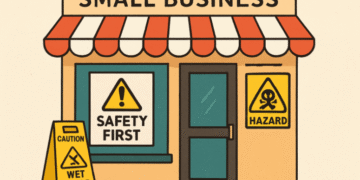Starting a company is one of the most exciting steps you can take in your professional journey. It’s not just about paperwork and legal structures—it’s about turning your ideas into something tangible, something that can provide value to others while building a legacy for yourself. Whether you’re an aspiring café owner, a budding tech founder, or someone ready to launch a creative agency, the process of establishing a company doesn’t need to feel overwhelming.
In this guide, we’ll break things down in a warm and practical way, so you can move forward with confidence.
Laying the Foundation: Your Business Idea and Vision
Every company starts with an idea. It doesn’t have to be world-changing right away—sometimes the best businesses are born from everyday challenges. Think of a parent who starts a small catering service because they’re already cooking for large family gatherings, or a tech-savvy individual who builds an app to simplify grocery deliveries.
What sets successful entrepreneurs apart is how clearly they define their vision. Ask yourself:
- Who am I serving?
- What problem am I solving?
- How will my business stand out?
By answering these questions, you’ll create a roadmap that will guide you through the rest of the setup process. A clear vision helps you stay motivated during tough times and provides direction when making big decisions.
Choosing the Right Business Structure
Once your idea is ready, it’s time to choose a structure for your company. This step is crucial because it affects how you’re taxed, your legal responsibilities, and the way your business can grow.
Here are the most common types of business structures:
- Sole Proprietorship – Simple, affordable, and easy to start, but you carry personal liability. Great for freelancers or very small businesses.
- Partnership – Ideal if you’re going into business with a partner, but requires clear agreements to avoid future conflicts.
- Company/Corporation – Offers limited liability and credibility, but comes with stricter compliance and reporting obligations.
- Trusts and Others – More complex, usually chosen for tax planning or asset protection.
For example, a freelance graphic designer might stick to a sole proprietorship, while a group of engineers developing a software product may prefer to register a company to attract investors and manage risk.
Registering Your Business and Meeting Legal Requirements
With your structure chosen, you’ll need to register your business. While the exact steps differ by country, the essentials are quite similar:
- Register a business name – Ensure it’s unique and accurately reflects your brand identity.
- Apply for the necessary licenses – A café will need health permits, while a construction company will need safety certifications.
- Obtain your tax identification – This ensures your company is recognized by government agencies and can operate legally.
- Open a business bank account – Keeping your personal and business finances separate makes accounting much easier.
It’s also important to be aware of your obligations around employee rights, workplace safety, and data privacy, depending on your industry. For example, a retail clothing store hiring part-time staff needs to comply with wage and labor laws, while an online store must handle customer data responsibly.
Funding and Financial Planning
Every business needs capital to get started. Some entrepreneurs bootstrap with personal savings, while others seek loans, investors, or grants. A key point is to create a realistic financial plan.
This includes:
- Startup costs (equipment, inventory, rent, marketing)
- Ongoing expenses (utilities, salaries, software subscriptions)
- Revenue projections (how much you expect to make monthly or annually)
For instance, a bakery might spend heavily upfront on ovens and interior design, but then focus on recurring costs, such as ingredients and staff. On the other hand, a software company may invest in developers early on but enjoy lower ongoing costs if it adopts a cloud-based model.
Having a solid financial plan makes it easier to attract investors and helps you avoid unpleasant surprises.
Growing Your Business
Establishing your company is only the first step the real challenge is growth. To succeed, you’ll need to invest in marketing, customer service, and continuous improvement.
- Marketing: From social media ads to word-of-mouth referrals, you’ll need strategies tailored to your audience. A restaurant might thrive with Instagram-worthy photos of dishes, while a consulting firm might gain clients through networking and publishing helpful articles.
- Customer experience: Businesses that prioritize a positive customer experience often grow faster. Think of how ride-sharing apps expanded not just by providing a service, but by making it convenient and easy to use.
- Adaptability: Markets change quickly. The companies that survive are those that evolve—whether by adopting new technology, adding new services, or shifting their focus when opportunities arise.
At some point, you may also need to expand your team. Hiring the right people can transform your company from a one-person show into a thriving organization.
Taking the Next Step
If you’re looking to establish a company in Australia, the process can be simplified by seeking guidance through professional services that walk you through registration, compliance, and structuring. These services can save you time, reduce stress, and ensure you don’t miss any legal or tax obligations. You can learn more about this process by visiting this link.
Final Thoughts
Starting a business isn’t just about forms and legalities it’s about creating something meaningful. Every café, online shop, or construction company you see today once began with someone who had the courage to take the first step.
By clarifying your vision, selecting the right structure, managing the legal aspects, planning finances wisely, and staying focused on growth, you’ll be well on your way to building something lasting.
Remember, even the largest companies in history—such as those that pioneered the Industrial Revolution began with a small team and a big idea. Yours can too.










